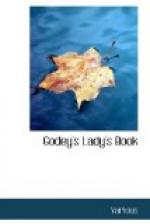It does not appear that Raleigh suspected the true cause of Elizabeth’s alienation from so good and great a servant: perhaps no one man of the many whom for the like cause she neglected, disgraced, persecuted, knew that the cause existed in the fact of their having taken to themselves partners of life and happiness—a solace which she sacrificed to the sterile honors of an undivided crown—of their enjoying the bliss and perfect contentment of a happy wedded life, while she, who would fain have enjoyed the like, could she have done so without the loan of some portion of her independent and undivided authority, was compelled, by her own jealousy of power and obstinacy of will, to pine in lonely and unloved virginity.
Yet such was doubtless the cause of his decline in the royal favor, which he never, in after days, regained; for, after Essex was dead by her award and deed, Elizabeth, in her furious and lion-like remorse, visited his death upon the heads of all those who had been his enemies in life, or counseled her against him, even when he was in arms against her crown; nor forgave them any more than she forgave herself, who died literally broken-hearted, the most lamentable and disastrous of women, if the proudest and most fortunate queens, in the heyday of her fortunes, when she had raised her England to that proud and pre-eminent station above rather than among the states of Europe, from which she never declined, save for a brief space under her successors, those weakest and wickedest of English kings, the ominous and ill-starred Stuarts, and which she still maintains in her hale and superb old age, savoring, after nearly nine centuries of increasing might and scarcely interrupted rule, in no respect of decrepitude or decay.
Her greatest crime was the death of Mary Stuart; her greatest misfortune, the death of Essex; her greatest shame, the disgrace of Walter Raleigh. But with all her crimes, all her misfortunes, all her shame, she was a great woman, and a glorious queen, and in both qualities peculiarly and distinctively English. The stay and bulwark of her country’s freedom and religion, she lived and died possessed of that rarest and most divine gift to princes, her people’s unmixed love and veneration.




